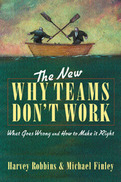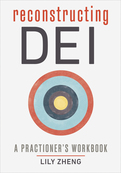The move to teams has largely failed, say Harvey Robbins and Michael Finley, mainly because teams themselves are failing to think through the human implications of teaming. The New Why Teams Don't Work is a handbook for team members and team leaders to maintain the highest possible level of team intelligence-the skills, attitudes, and emotional flexibility to get the most out of a team's inherent differences.
Describing what teams are really like, not how they ought to be, the book teaches people how to work together to make decisions, stay in budget, and achieve team goals. Robbins and Finley show, for instance, how to get hidden agendas on the table, clarify individual roles, learn what team members expect and want from each other, choose the right decision-making process, and much more.
Updated throughout, the book includes completely new material on team intelligence, team technology, collaboration vs. teamwork, team balance, teams at the top, the team of one, plus all new and updated examples.
The move to teams has largely failed, say Harvey Robbins and Michael Finley, mainly because teams themselves are failing to think through the human implications of teaming. The New Why Teams Don't Work is a handbook for team members and team leaders to maintain the highest possible level of team intelligence-the skills, attitudes, and emotional flexibility to get the most out of a team's inherent differences.
Describing what teams are really like, not how they ought to be, the book teaches people how to work together to make decisions, stay in budget, and achieve team goals. Robbins and Finley show, for instance, how to get hidden agendas on the table, clarify individual roles, learn what team members expect and want from each other, choose the right decision-making process, and much more.
Updated throughout, the book includes completely new material on team intelligence, team technology, collaboration vs. teamwork, team balance, teams at the top, the team of one, plus all new and updated examples.
-
Based on the authors' bestselling book Why Teams Don't Work-winner of the Financial Times/Booz Allen & Hamilton Global Business Book Award as the Best Management Book of the Year in the Americas
-
Teaches people how to be good team members and teaches team members how to be team leaders
-
Includes seven completely new chapters as well as new and updated examples and information throughout
The move to teams has largely failed, say Harvey Robbins and Michael Finley, mainly because teams themselves are failing to think through the human implications of teaming. The New Why Teams Don't Work is a handbook for team members and team leaders to maintain the highest possible level of team intelligence-the skills, attitudes, and emotional flexibility to get the most out of a team's inherent differences.
Describing what teams are really like, not how they ought to be, the book teaches people how to work together to make decisions, stay in budget, and achieve team goals. Robbins and Finley show, for instance, how to get hidden agendas on the table, clarify individual roles, learn what team members expect and want from each other, choose the right decision-making process, and much more.
Updated throughout, the book includes completely new material on team intelligence, team technology, collaboration vs. teamwork, team balance, teams at the top, the team of one, plus all new and updated examples.
The move to teams has largely failed, say Harvey Robbins and Michael Finley, mainly because teams themselves are failing to think through the human implications of teaming. The New Why Teams Don't Work is a handbook for team members and team leaders to maintain the highest possible level of team intelligence-the skills, attitudes, and emotional flexibility to get the most out of a team's inherent differences.
Describing what teams are really like, not how they ought to be, the book teaches people how to work together to make decisions, stay in budget, and achieve team goals. Robbins and Finley show, for instance, how to get hidden agendas on the table, clarify individual roles, learn what team members expect and want from each other, choose the right decision-making process, and much more.
Updated throughout, the book includes completely new material on team intelligence, team technology, collaboration vs. teamwork, team balance, teams at the top, the team of one, plus all new and updated examples.The move to teams has largely failed, say Harvey Robbins and Michael Finley, mainly because teams themselves are failing to think through the human implications of teaming. The New Why Teams Don't Work is a handbook for team members and team leaders to maintain the highest possible level of team intelligence-the skills, attitudes, and emotional flexibility to get the most out of a team's inherent differences.
Describing what teams are really like, not how they ought to be, the book teaches people how to work together to make decisions, stay in budget, and achieve team goals. Robbins and Finley show, for instance, how to get hidden agendas on the table, clarify individual roles, learn what team members expect and want from each other, choose the right decision-making process, and much more.
Updated throughout, the book includes completely new material on team intelligence, team technology, collaboration vs. teamwork, team balance, teams at the top, the team of one, plus all new and updated examples.
-
Based on the authors' bestselling book Why Teams Don't Work-winner of the Financial Times/Booz Allen & Hamilton Global Business Book Award as the Best Management Book of the Year in the Americas
-
Teaches people how to be good team members and teaches team members how to be team leaders
-
Includes seven completely new chapters as well as new and updated examples and information throughout
The move to teams has largely failed, say Harvey Robbins and Michael Finley, mainly because teams themselves are failing to think through the human implications of teaming. The New Why Teams Don't Work is a handbook for team members and team leaders to maintain the highest possible level of team intelligence-the skills, attitudes, and emotional flexibility to get the most out of a team's inherent differences.
Describing what teams are really like, not how they ought to be, the book teaches people how to work together to make decisions, stay in budget, and achieve team goals. Robbins and Finley show, for instance, how to get hidden agendas on the table, clarify individual roles, learn what team members expect and want from each other, choose the right decision-making process, and much more.
Updated throughout, the book includes completely new material on team intelligence, team technology, collaboration vs. teamwork, team balance, teams at the top, the team of one, plus all new and updated examples.














